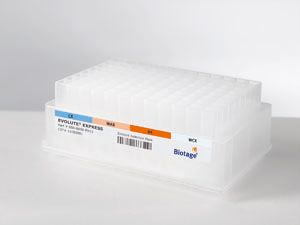Biotage EVOLUTE® EXPRESS
The EVOLUTE? EXPRESS range of 96-well SPE plates combine powerful EVOLUTE sorbent chemistry with innovative features that enhance productivity by optimizing and even eliminating the need for some traditional SPE procedural steps.

EVOLUTE® EXPRESS, is a novel family of 96-well plates that simplify polymer-based SPE by employing a streamlined 3-step protocol; Load-Wash-Elute. By using this approach and removing the conditioning and equilibration steps, necessary with traditional bio-analytical SPE procedures, processing and method development times are dramatically reduced without loss of analyte recovery or method robustness.
The EVOLUTE® EXPRESS design provides a uniform flow in the processing of aqueous samples and eliminates the need to re-run samples due to well-clogging. This clear flow technology makes EVOLUTE® EXPRESS particularly efficient and effective when used with SPE automated systems whilst adding a distinct advantage by allowing consistent, rapid and reliable manual processing of the plates.
The new plates address a real concern for many analysts who have to re-run samples due to well-clogging and sample variability. EVOLUTE® EXPRESS simplifies sample preparation, promoting high throughput and reliability. The minimal 3-step approach of Load-Wash-Elute considerably improves the way SPE is performed and offers significant time savings for all bio-analysis labs.
EVOLUTE® EXPRESS 96-well plates are packed with polymer-based EVOLUTE® chemistries (ABN, CX, WCX, AX and WAX) to address most application needs, and a new sorbent selection plate for screening and method development has been added.

Contact Details
Biotage AB, Sweden
Kungsgatan 76 SE-753 18 Uppsala, Sweden
Telephone: +46 18 56 57 10
Toll Free: +800 1856 5710
Fax: +46 18 56 57 05
Email:
marcom@biotage.comWebsite: www.biotage.com
Best of the Week: Food Analysis, Chemical Migration in Plastic Bottles, STEM Researcher of the Year
December 20th 2024Top articles published this week include the launch of our “From Lab to Table” content series, a Q&A interview about using liquid chromatography–high-resolution mass spectrometry (LC–HRMS) to assess chemical hazards in plastic bottles, and a piece recognizing Brett Paull for being named Tasmanian STEM Researcher of the Year.
Using LC-MS/MS to Measure Testosterone in Dried Blood Spots
December 19th 2024Testosterone measurements are typically performed using serum or plasma, but this presents several logistical challenges, especially for sample collection, storage, and transport. In a recently published article, Yehudah Gruenstein of the University of Miami explored key insights gained from dried blood spot assay validation for testosterone measurement.
Determination of Pharmaceuticals by Capillary HPLC-MS/MS (Dec 2024)
December 19th 2024This application note demonstrates the use of a compact portable capillary liquid chromatograph, the Axcend Focus LC, coupled to an Agilent Ultivo triple quadrupole mass spectrometer for quantitative analysis of pharmaceutical drugs in model aqueous samples.